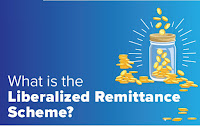Are you planning to go on a vacation abroad? If yes,
you need to know about the new Tax Collection at Source (TCS) rules because they
will significantly impact everything you purchase abroad.
In the Budget 2023, the Indian government had proposed that if you are planning to invest in foreign stocks, gift abroad or purchasing an overseas tour package, then the rate of TCS will be 20% without any threshold limit. This unexpected tax policy has captured the attention of individuals and businesses alike, sparking confusion and frustration.
So, in today’s blog, let’s break it down and explore
what TCS is and why it is being levied on your overseas credit card adventures.
What’s Latest Buzz?
What is LRS?
The person can make the following remittances under
this scheme:-
Ø
Private visit to any country (except Nepal and Bhutan)
Ø
Gift or Donation
Ø
Studies
Ø
Medical treatment
Ø
Traveling
Ø
Maintenance of close relatives abroad
Ø
Purchase of property
Ø
Investment in shares, mutual funds, and debts
Note: Individuals
can avail of the exchange facility in excess of the limit prescribed under the LRS
if it is required by the universities, medical institutes for studies, or medical
treatment.
What is the TCS?
Starting from 1st July 2023, a 20% Tax Collection at
Source (TCS) will apply to these transactions, excluding education and medical expenses.
When is TCS applicable on Foreign Remittances?
TCS is applicable in the following situations:-
(a) If an authorized dealer receives
an amount of more than INR 7,00,000 in a financial year from a buyer who is remitting
the amount outside India under the LRS, then the dealer is required to collect TCS
in excess of INR 7,00,000.
(b) In the case of the sale of an
overseas tour program package, the seller should collect TCS on the entire amount
received from the buyer irrespective of any limit.
TCS on International Credit Card Payments:
On 16th May 2023, the government announced that 20% TCS will be applicable on credit card payments made overseas/abroad from 1st July 2023 onwards.
Rate of TCS on Foreign Remittance:
(a) TCS should be collected by the
seller or authorized dealer at the rate of 5%.
(b) If an educational loan is taken
from Financial institutions for remitting the amount then the TCS rate will be 0.5%
instead of 5%.
Let’s understand this with the help of an example:
Example 1: Mr Ganesh is
remitting the amount of INR 10,00,000 under the LRS for medical treatment. In this
case, the seller should collect TCS at the rate of 5% on the excess amount of INR
7,00,000. The tax collected will be INR 15,000 (INR 3,00,000*5%).
Example 2: Mr Suresh is planning to purchase an overseas tour package from a tour operator for an amount of INR 5,00,000. As per Budget 2023, TCS should be collected by the seller at the rate of 20% of the entire amount. Thus, the TCS will be INR 1,00,000 (INR 5,00,000*20%). Basically, Ram needs to pay INR 6,00,000 to the tour operator.
Now, Where is the Confusion?
Following the hike in TCS rates, various calculations started circulating to determine the impact on individuals. For instance, if someone spends Rs 5 lakh on foreign travel, it was suggested that they would have to pay Rs 1 lakh as TCS, resulting in a total expenditure of Rs 6 lakh.
However, it's important to note that on 19th May 2023,
the Finance Ministry has provided a clarification to ease concerns. They stated
that personal payments made abroad using international debit and credit cards, up
to Rs 7 lakh in a year, will not be subjected to the TCS. The ministry emphasised
that the exemption for education and medical expenses would still be applicable.
When to collect TCS on Foreign Remittance?
TCS should be collected either at the time of :
(a) Receipt of remittance amount
by any mode from the buyer or
(b) At the time of debiting the amount
payable by the buyer, whichever is earlier
Exemptions from TCS
Following are the conditions in which TCS will not be
applicable:-
(a) TDS is applicable under any other provision of the Income Tax Act,
(b) Buyer is a CG, SG, High Commission,
Consulate, Foreign diplomat, Local authority, or any other notified person, and
(c) The amount remitted is up to
INR 7,00,000 for studies or medical treatment.
TCS Return
The seller shall be liable to file a return in Form 27EQ if TCS has been collected by the seller on foreign remittance or on the sale of the overseas tour package. Also, the seller can provide a certificate in Form 27D to the buyer whose tax has been collected.
Demand From Tour Operators
Apart from international card payments, booking a foreign tour package will also attract a 20% TCS, which was 5% starting from 1st July 2023. Hence, domestic tour operators and travel platforms have expressed concerns and called for removing the proposed 20% TCS.
According to Economic Times, Rajiv Mehra, the President
of the Indian Association of Tour Operators, has criticised the requirement for
domestic tour operators to offer foreign tour packages at a 20% TCS rate. He argues
that many travel agents are still grappling with the repercussions of the COVID-19
pandemic, and imposing such a high tax would further strain their recovery efforts.
Mehra suggests that the TCS exemption of Rs 7 lakh should also be extended to domestic
tour operators, providing them with some relief and enabling a smoother revival
for the industry.
That's it for
today. I hope you've found this blog informative. Remember to spread the word among
your friends.




















No comments:
Post a Comment